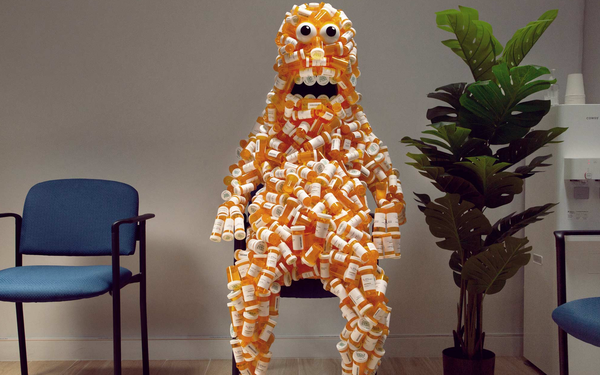pharma
'Monsters in Waiting' Rooms Help 'Flip The Script' On Overused Antibiotics
- by Les Luchter , April 10, 2024

When Reckitt’s Mucinex told us late last year that its “Flip the Script” campaign would use educational materials in urgent care centers to argue against prescribing antibiotics for cold and flu symptoms, we didn’t envision the symbolic materials that appeared in Queens, New York, on April 9: two human-sized monsters made respectively of pill bottles and paper prescriptions.
The “Monsters in Waiting,” part of the cold-and-flu season campaign developed with Interpublic’s McCann and named Amber and Rex respectively, visited HealthNeed Medical Urgent Care to stop the problem at its prime source: consumers who ask for antibiotic prescriptions when they’re not needed.
advertisement
advertisement
Each of Rex’s paper prescriptions prescribed 300 mg of antibiotics, with the instructions, “Do not use to treat cold or flu symptoms.” The same message was inscribed on the pill bottles that made up Amber
Each monster sculpture was accompanied by a museum-like info card, complete with a UPC code, the medium the art was created in (“reclaimed plastic” for Amber; “recycled paper” for Rex),and the following paragraph: “Let’s not create a monster. Antibiotics are amazing. But they don’t work on cold and flu symptoms. In fact, asking for them to treat coughs, congestion and the sniffles can lead to monstrous consequences. Like antibiotic resistance, which causes up to 35,000 deaths each year. Scan the code to learn how Mucinex is helping to flip the script on antibiotic overuse.”
The Journal of the American Medical Association has reported that 70% of urgent care center patients ask their doctor for an antibiotic, and that 45.7% of inappropriate antibiotic prescriptions for respiratory symptoms come from those centers.
Mark Pearson, Reckitt’s vice president, marketing for health brands, told Marketing Daily that the brand was partnering with more than 1,000 urgent care centers and primary care centers -- concentrated in states “most impacted” by Antimicrobial Resistance (AMR), which the Centers for Disease Control say is caused by overuse of antibiotics over time.
Pearson explained that by reaching consumers “at the point of requesting an antibiotic,” the urgent care partnerships provided “the potential to make a real impact to patients.”
Point-of-care materials at centers have included a “flipped” brochure, with one cover reading “Let’s flip the script on antibiotic overuse.” When flipped over, Mucinex coupons are added to the line. Inside, the brochure includes info on both AMR and the difference between viral and bacterial infections.
Physicians could also use a Mucinex “prescription pad” to “prescribe” (recommend) a Mucinex product vs. an antibiotic.



